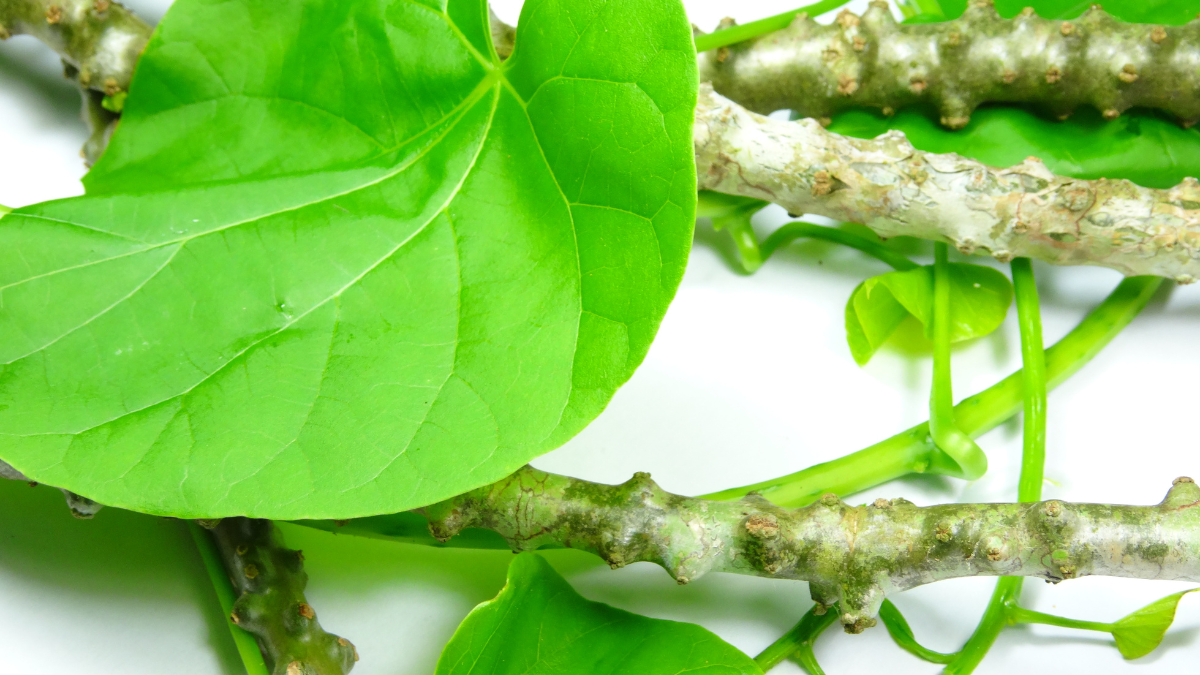Table of Contents
Introduction Of Growing Giloy at Home
Overview of Growing Giloy at Home
Picture a vibrant, heart-shaped vine weaving through the tropical landscapes of India, reaching for the sun with a promise of good health. That’s Giloy, scientifically called Tinospora Cordifolia. This leafy climber isn’t just a pretty sight – it’s a health superhero! For ages, people in India have turned to Giloy as a trusted sidekick in Ayurvedic medicine. Let’s unravel the story of this amazing plant and its age-old secrets to staying healthy and happy.
Benefits of Growing Giloy at Home
When you cultivate Giloy at home, you are gifted with an ever-ready supply of nutritional and medicinal benefits right at your doorstep. Its leaves, stem, and root have potent immunity-boosting properties, and it’s believed to aid in managing diverse health issues, including fever, diabetes, and stress.
Understanding Growing Giloy at Home
Botanical Information About Growing Giloy at Home
Giloy is a deciduous, climbing shrub with succulent stems and lobed leaves. The plant blooms yellow or green flowers and produces drupe-like fruits.
Varieties of Growing Giloy at Home
While Tinospora cordifolia is the most common variety, other species like Tinospora Crispa and Tinospora sinensis also possess medicinal properties.
Medicinal Properties
Rich in antioxidants, Giloy detoxifies the body, purifies the blood, and boosts immunity. It also enhances digestive health and is known for its anti-inflammatory and anti-cancer properties.
Selecting the Right Location Growing Giloy at Home
Sunlight Requirements
Giloy thrives in a sunny area with partial shade, balancing exposure and protection.
Soil Conditions
It prefers well-draining, fertile soil with a neutral or slightly acidic pH.
Climate Considerations
Giloy is a tropical plant and thus, requires a warm and humid climate to grow.
Planting & Growing Giloy at Home
Choosing the Right Time
The monsoon season provides ample moisture and humidity and is the ideal time for planting Giloy.
Propagation Methods
Giloy can be propagated both by seeds and stem cuttings. However, stem cuttings are preferred due to their higher success rate.
Planting Process Step-by-Step
Place the stem cuttings in a pot filled with rich, well-draining soil. Water the cuttings regularly and maintain a warm and humid environment.
To learn more about planting, Click here
Video: https://youtu.be/TOn9WEq-ceQ?si=e0CWYlEmAjtNAT0n
Caring for Growing Giloy at Home
Watering Guidelines
Giloy plants need regular watering but avoid overwatering as it might lead to root rot.
Fertilizing Tips
Feed your Giloy plant with a high-nitrogen fertilizer every 4-6 weeks during the growing season for optimal growth.
Pruning and Training
Regular pruning helps maintain the size of the Giloy plant and promotes thicker growth. Training the plant with a support or trellis will help it grow upward and prevent it from spreading out too much.
Common Issues and Solutions Growing Giloy at Home
Pests and Diseases
Giloy plants are generally resistant to pests and diseases but might occasionally be affected by aphids, mites, or powdery mildew.
Recognizing Symptoms
Early detection is key in managing these issues. Yellowing leaves, curled edges, and white powdery traces are signs of pest infestation or disease.
Organic Remedies
Neem oil, insecticidal soap, or homemade garlic sprays can be used to tackle pests. For diseases, removing affected parts and ensuring proper air circulation can help.
Harvesting and Storage
Determining Readiness for Harvest
Giloy is ready for harvest when the stem is thick and fleshy. Typically, it takes around 3-4 months from planting to reach this stage.
Harvesting Techniques
Use a sharp, sterilized knife to cut the stem near the base. Always leave a part of the stem on the plant for future growth.
Proper Storage Methods
Once harvested, Giloy stems can be stored in the refrigerator for a few days. For longer storage, drying and grinding it into a powder can be effective.
Creative Uses of Giloy
Culinary Applications
Giloy is often used to make herbal teas and juice. It can also be added to soups and broths for a healthy twist.
DIY Herbal Remedies
Giloy can be used to prepare various home remedies – from immunity-boosting concoctions to skin healing pastes.
Incorporating Giloy into Everyday Life
Regular inclusion of Giloy in your diet or skincare routine can bring about significant health benefits.
Community and Cultural Significance
Giloy in Traditional Medicine
Giloy has been a staple in Ayurvedic medicine for centuries. It is highly regarded for its healing properties.
Folklore and Beliefs
In Indian mythology, Giloy is considered the ‘nectar of gods’ and is believed to have sprouted from the heavenly nectar ‘Amrit’.
Sharing Giloy Knowledge
Growing Giloy at home benefits you and allows you to share its benefits with your community.
Conclusion
Recap of Key Points
Giloy, with its immense health benefits and ease of cultivation, is a great addition to any home garden.
Encouragement for Home Gardeners
With a little effort and care, anyone can grow and benefit from this miraculous plant.
To know how to grow giloy plant in water
Video: https://youtu.be/h97jCK85Pf4?si=v-JpnmIE9ONZRcir
Frequently Asked Questions
11.1 What is the best time of day to water the Giloy plant?
The best time to water your Giloy plant is early morning before the temperatures rise. This allows the plant to absorb the water before the hot sun can evaporate it.
11.2 Can I grow Giloy indoors?
Yes, Giloy can be grown indoors. However, ensure it gets adequate sunlight and is placed in a well-draining pot to prevent root rot.
11.3 How often should I fertilize my Giloy plant?
It’s recommended to feed your Giloy plant with a high-nitrogen fertilizer every 4-6 weeks during the growing season for optimal growth.








![Newzvilla Maruti eVX Electric SUV to Feature Dual Screens and Rotary Dial [Video].](https://newzvilla.co.in/wp-content/uploads/2024/04/Screenshot-2024-04-04-212840-551x431.png)




Leave feedback about this